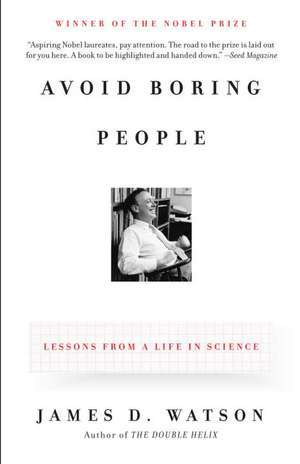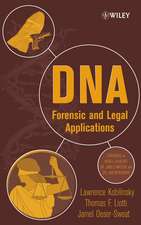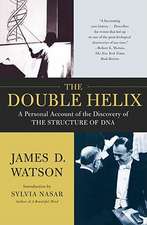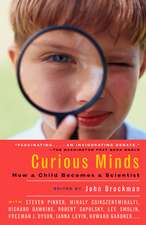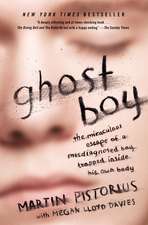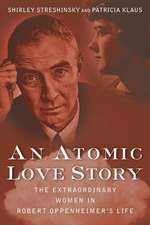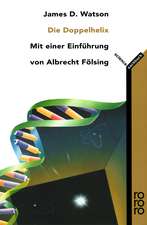Avoid Boring People: Lessons from a Life in Science
Autor James D Watson Hanna H. Grayen Limba Engleză Paperback – 30 apr 2010
In Avoid Boring People, Watson lays down a life’s wisdom for getting ahead in a competitive world. Witty and uncompromisingly honest, he shares his thoughts on how young scientists should choose the projects that will shape their careers, the supreme importance of collegiality, and dealing with competitors within the same institution. It’s an irreverent romp through Watson’s colorful career and an indispensable guide to anyone interested in nurturing the life of the mind.
| Toate formatele și edițiile | Preț | Express |
|---|---|---|
| Paperback (2) | 111.17 lei 22-36 zile | |
| Vintage Books USA – 30 apr 2010 | 111.17 lei 22-36 zile | |
| Oxford University Press – 23 oct 2008 | 141.03 lei 31-37 zile | |
| Hardback (1) | 128.10 lei 31-37 zile | |
| OUP OXFORD – 22 oct 2007 | 128.10 lei 31-37 zile |
Preț: 111.17 lei
Nou
Puncte Express: 167
Preț estimativ în valută:
21.27€ • 22.27$ • 17.60£
21.27€ • 22.27$ • 17.60£
Carte disponibilă
Livrare economică 17-31 martie
Preluare comenzi: 021 569.72.76
Specificații
ISBN-13: 9780375727146
ISBN-10: 0375727140
Pagini: 347
Ilustrații: 27 PHOTOGRAPHS
Dimensiuni: 135 x 206 x 19 mm
Greutate: 0.33 kg
Editura: Vintage Books USA
ISBN-10: 0375727140
Pagini: 347
Ilustrații: 27 PHOTOGRAPHS
Dimensiuni: 135 x 206 x 19 mm
Greutate: 0.33 kg
Editura: Vintage Books USA
Notă biografică
James D. Watson was director of Cold Spring Harbor Laboratory in New York from 1968 to 1993 and is now its chancellor emeritus. He was the first director of the National Center for Human Genome Research of the National Institutes of Health from 1989 to 1992. A member of the National Academy of Sciences and the Royal Society, he has received the Copley Medal of the Royal Society and is a Knight of the British Empire (KBE). He has also received the Presidential Medal of Freedom, the National Medal of Science, and, with Francis Crick and Maurice Wilkins, the Nobel Prize in Physiology or Medicine in 1962.
Extras
Remembered Lessons from Childhood on Chicago's South Side
1. Avoid fighting bigger boys or dogs
As a child I lived with being punier than other boys in class. The only consolation was my parents' empathy—they encouraged constant trips to the local drugstore for chocolate milk shakes to fatten me up. The shakes made me happy, but still all through grammar school other kids shoved me around. At first I responded with my fists, but soon I realized that being called a sissy was a better fate than being beaten up. It was easier to cross to the other side of the street than come face-to-face with loitering menaces with a nose for my fear. Likewise, I was no match for barking dogs, particularly ones I had provoked by climbing over fences into their domains. Spotting a rare bird is never worth the bite of a cur. Once bitten by a German shepherd, I knew that I preferred cats, even if they are bird-killers. Life is long enough for more than one chance at a rare bird.
2. Put lots of spin on balls
I long wanted to be part of the softball games played on the big vacant lot across Seventy-ninth Street. At first my only way to join in was to field foul balls. Then I learned how to put spin on underhanded pitches that kept even the better batters from routinely smacking line drives through holes in the outfield. From then on I felt much less an outsider on Saturday mornings. The spins that came from similarly slicing ping-pong serves helped make me a good player well before my arms got long enough to reach near the net of our family’s basement table.
3. Never accept dares that put your life at risk
Seeing classmates dash across a street to beat a coming car filled me with more horror than envy of their bravado. When I rode my bike three miles to the Museum of Science and Industry, I knew my constantly worrying mother would have preferred my taking the streetcar. But by being cautious—going down as many alleys as possible and never taking my hands off the handlebars when a car was passing—I was never really putting my life at significant risk. Likewise, in climbing up and over the branches of neighborhood trees or hoisting myself up along gutters to the roofs of one-story garages, I may have been risking a broken leg but not a fatal fall. The possibility of plunging more than ten feet never seemed worth the thrill of being high up.
4. Accept only advice that comes from experience as opposed to revelation
Listening to my elders just because they were older was not the way I grew up. Preadolescent exposure to my relatives’ views that the New Deal would bankrupt the United States and that Hitler would cease being an aggressor after conquering England left me with no illusions that adults are less likely than children to utter nonsense. For the most part, my parents tried to provide rational explanations for why I should think a certain way or do a certain thing. So I was convinced by my mother’s advice that I wear rubbers on rainy days so as not to ruin my leather soles. At the same time, I rejected her no less often heard argument that sodden feet led to colds.
By then I was conditioned to accept my father’s disdain for any explanations that went beyond the laws of reason and science. Astrology had to be bunk until someone could demonstrate in a verifiable way that the arrangement of the stars and planets affected the course of individual lives. Equally improbable to Dad was the idea of a supreme being, the widespread belief in whose existence was in no way subject to observation or experimentation. It is no coincidence that so many religious beliefs date back to times when no science could possibly have accounted satisfactorily for many of the natural phenomena inspiring scripture and myths.
5. Hypocrisy in search of social acceptance erodes your self-respect
My parents and most of their neighbors had nothing bonding them together but Horace Mann Grammar School. Mother, with an outgoing and generous personality, naturally rose to be president of the PTA. But except for a keen interest in baseball, Dad had nothing in common with his fellow fathers. That love, however, seldom drew him into the backyards of neighbors, where frequent blasts at the New Deal and occasional anti-Semitic jokes were insufferable for Dad, whose favorite radio personality besides Franklin Roosevelt was the Jewish intellectual Clifton Fadiman. He knew enough to avoid occasions where polite silence in response to repulsive remarks could be construed as acquiescence in their awfulness.
6. Never be flippant with teachers
My parents made it clear that I should never display even the slightest disrespect to individuals who had the power to let me skip a half grade or move into more challenging classes. While it was all right for me to know more about a topic than my sixth-grade teacher had ever learned, questioning her facts could only lead to trouble.Until one has cleared high school there is little to be gained by questioning what your teacher wants you to learn. Better to memorize obligingly their pet facts and get perfect grades. Save flights of rebellion for when authority does not have you by the throat.
7. When intellectually panicking, get help quickly
Occasionally I found myself nervously distraught, unable to repeat an algebraic trick I had learned the previous day. I never hesitated in such circumstances to turn to a classmate for help. Better for one of them to know my inadequacies than not to be able to go on to the next problem. “Do it yourself or you’ll never learn” may have some validity, but fail to get it done and you’ll go nowhere. Even more frequently I was unable to express myself in words and habitually procrastinated with writing assignments. It was only with my mother’s last-minute help that I punctually submitted a well-written eighth-grade paper on the history of Chicago. Of much greater importance was Mother’s later insistence that she edit every word of my scholarship essay to the University of Chicago. I accepted her extensive editing with little guilt, then or since.
8. Find a young hero to emulate
On one of our regular Friday night visits to the Seventy-third Street public library, my father encouraged me to borrow Paul de Kruif’s celebrated 1926 book, Microbe Hunters. In it were fascinating stories of how infectious diseases were being conquered by scientists who went after bad germs with the same tenacity as Sherlock Holmes pursuing the evil Dr. Moriarty. Some months later I brought home Arrowsmith, in which Sinclair Lewis, helped by Paul de Kruif as expert consultant, relates the never-realized hope of his hero to save victims from cholera by treating them with bacteria-killing viruses. The protagonist’s youth gripped me and made me realize that science could be like baseball: a young man’s game whose stars made their mark in their early twenties.
Also encouraging me to aim high was my not-too-distant cousin Orson Welles, whose grandmother was a Watson. Though we never met, he also had an Illinois background and after being effectively orphaned was partly raised by my father’s uncle, the celebrated Chicago artist Dudley Crafts Watson. Always turned out with much panache, including a pince-nez, Dudley relished telling his nephew’s family of Orson’s triumphs, which began when he was a child actor in the Todd School. Orson’s daring was what appealed to me most, from his famous War of the Worlds radio hoax to his groundbreaking feature Citizen Kane. A scientist’s hero need not be a microbiologist, let alone a baseball player.
From the Hardcover edition.
1. Avoid fighting bigger boys or dogs
As a child I lived with being punier than other boys in class. The only consolation was my parents' empathy—they encouraged constant trips to the local drugstore for chocolate milk shakes to fatten me up. The shakes made me happy, but still all through grammar school other kids shoved me around. At first I responded with my fists, but soon I realized that being called a sissy was a better fate than being beaten up. It was easier to cross to the other side of the street than come face-to-face with loitering menaces with a nose for my fear. Likewise, I was no match for barking dogs, particularly ones I had provoked by climbing over fences into their domains. Spotting a rare bird is never worth the bite of a cur. Once bitten by a German shepherd, I knew that I preferred cats, even if they are bird-killers. Life is long enough for more than one chance at a rare bird.
2. Put lots of spin on balls
I long wanted to be part of the softball games played on the big vacant lot across Seventy-ninth Street. At first my only way to join in was to field foul balls. Then I learned how to put spin on underhanded pitches that kept even the better batters from routinely smacking line drives through holes in the outfield. From then on I felt much less an outsider on Saturday mornings. The spins that came from similarly slicing ping-pong serves helped make me a good player well before my arms got long enough to reach near the net of our family’s basement table.
3. Never accept dares that put your life at risk
Seeing classmates dash across a street to beat a coming car filled me with more horror than envy of their bravado. When I rode my bike three miles to the Museum of Science and Industry, I knew my constantly worrying mother would have preferred my taking the streetcar. But by being cautious—going down as many alleys as possible and never taking my hands off the handlebars when a car was passing—I was never really putting my life at significant risk. Likewise, in climbing up and over the branches of neighborhood trees or hoisting myself up along gutters to the roofs of one-story garages, I may have been risking a broken leg but not a fatal fall. The possibility of plunging more than ten feet never seemed worth the thrill of being high up.
4. Accept only advice that comes from experience as opposed to revelation
Listening to my elders just because they were older was not the way I grew up. Preadolescent exposure to my relatives’ views that the New Deal would bankrupt the United States and that Hitler would cease being an aggressor after conquering England left me with no illusions that adults are less likely than children to utter nonsense. For the most part, my parents tried to provide rational explanations for why I should think a certain way or do a certain thing. So I was convinced by my mother’s advice that I wear rubbers on rainy days so as not to ruin my leather soles. At the same time, I rejected her no less often heard argument that sodden feet led to colds.
By then I was conditioned to accept my father’s disdain for any explanations that went beyond the laws of reason and science. Astrology had to be bunk until someone could demonstrate in a verifiable way that the arrangement of the stars and planets affected the course of individual lives. Equally improbable to Dad was the idea of a supreme being, the widespread belief in whose existence was in no way subject to observation or experimentation. It is no coincidence that so many religious beliefs date back to times when no science could possibly have accounted satisfactorily for many of the natural phenomena inspiring scripture and myths.
5. Hypocrisy in search of social acceptance erodes your self-respect
My parents and most of their neighbors had nothing bonding them together but Horace Mann Grammar School. Mother, with an outgoing and generous personality, naturally rose to be president of the PTA. But except for a keen interest in baseball, Dad had nothing in common with his fellow fathers. That love, however, seldom drew him into the backyards of neighbors, where frequent blasts at the New Deal and occasional anti-Semitic jokes were insufferable for Dad, whose favorite radio personality besides Franklin Roosevelt was the Jewish intellectual Clifton Fadiman. He knew enough to avoid occasions where polite silence in response to repulsive remarks could be construed as acquiescence in their awfulness.
6. Never be flippant with teachers
My parents made it clear that I should never display even the slightest disrespect to individuals who had the power to let me skip a half grade or move into more challenging classes. While it was all right for me to know more about a topic than my sixth-grade teacher had ever learned, questioning her facts could only lead to trouble.Until one has cleared high school there is little to be gained by questioning what your teacher wants you to learn. Better to memorize obligingly their pet facts and get perfect grades. Save flights of rebellion for when authority does not have you by the throat.
7. When intellectually panicking, get help quickly
Occasionally I found myself nervously distraught, unable to repeat an algebraic trick I had learned the previous day. I never hesitated in such circumstances to turn to a classmate for help. Better for one of them to know my inadequacies than not to be able to go on to the next problem. “Do it yourself or you’ll never learn” may have some validity, but fail to get it done and you’ll go nowhere. Even more frequently I was unable to express myself in words and habitually procrastinated with writing assignments. It was only with my mother’s last-minute help that I punctually submitted a well-written eighth-grade paper on the history of Chicago. Of much greater importance was Mother’s later insistence that she edit every word of my scholarship essay to the University of Chicago. I accepted her extensive editing with little guilt, then or since.
8. Find a young hero to emulate
On one of our regular Friday night visits to the Seventy-third Street public library, my father encouraged me to borrow Paul de Kruif’s celebrated 1926 book, Microbe Hunters. In it were fascinating stories of how infectious diseases were being conquered by scientists who went after bad germs with the same tenacity as Sherlock Holmes pursuing the evil Dr. Moriarty. Some months later I brought home Arrowsmith, in which Sinclair Lewis, helped by Paul de Kruif as expert consultant, relates the never-realized hope of his hero to save victims from cholera by treating them with bacteria-killing viruses. The protagonist’s youth gripped me and made me realize that science could be like baseball: a young man’s game whose stars made their mark in their early twenties.
Also encouraging me to aim high was my not-too-distant cousin Orson Welles, whose grandmother was a Watson. Though we never met, he also had an Illinois background and after being effectively orphaned was partly raised by my father’s uncle, the celebrated Chicago artist Dudley Crafts Watson. Always turned out with much panache, including a pince-nez, Dudley relished telling his nephew’s family of Orson’s triumphs, which began when he was a child actor in the Todd School. Orson’s daring was what appealed to me most, from his famous War of the Worlds radio hoax to his groundbreaking feature Citizen Kane. A scientist’s hero need not be a microbiologist, let alone a baseball player.
From the Hardcover edition.
Recenzii
“Aspiring Nobel laureates, pay attention. The road to the prize is laid out for you here. A book to be highlighted and handed down.”
—Seed Magazine
“Insightful, useful and on target about science, competition, leadership, teaching and academic success. . . . Watson remains one of the most fascinating scientists of our time, as iconic in some respects as is the double helix.”
—Nature
“Entertaining. . . . Watson passes on what he can to young scientists coming up and to the rest of us as well.”
—Los Angeles Times
“Watson is both a scientific genius and a larger-than-life personality. . . . If you want to learn how science gets done in the real world . . . Watson makes for a wonderful guide.”
—The Boston Globe
“Vintage Watson: brash, bumptious, brilliant—and never boring.”
—Kirkus
“Watson proves as engaging as ever.”
—Booklist
“Entertaining and historically revealing.”
—Publishers Weekly
—Seed Magazine
“Insightful, useful and on target about science, competition, leadership, teaching and academic success. . . . Watson remains one of the most fascinating scientists of our time, as iconic in some respects as is the double helix.”
—Nature
“Entertaining. . . . Watson passes on what he can to young scientists coming up and to the rest of us as well.”
—Los Angeles Times
“Watson is both a scientific genius and a larger-than-life personality. . . . If you want to learn how science gets done in the real world . . . Watson makes for a wonderful guide.”
—The Boston Globe
“Vintage Watson: brash, bumptious, brilliant—and never boring.”
—Kirkus
“Watson proves as engaging as ever.”
—Booklist
“Entertaining and historically revealing.”
—Publishers Weekly
Descriere
Descriere de la o altă ediție sau format:
James D. Watson looks back on his extraordinary and varied career -- from its beginnings as a schoolboy in Chicago's South Side to the day he left Harvard almost 50 years later, world-renowned as the co-discoverer of DNA -- and considers the lessons he has learnt along the way. The result is both an engagingly eccentric memoir and an insightful compendium of lessons in life for aspiring scientists. Watson's 'manners' range from those he learnt bird-watching with his father during the Great Depression ('Avoid fighting bigger boys and dogs' and 'Find a young hero to emulate') to the manners appropriate for a Nobel Prize ('Have friends close to those who rule'). He evokes his time as a graduate student in the 1940s ('Hire spunky lab helpers'); the excitement of working in DNA for the first time as well as having his first dates; his time working as a White House advisor; and at Harvard in the '70s. Avoid Boring People is a quirky, original, wise, and infuriatingly un-put-downable blend of candid anecdotes and revealing insights into the life of one of the greatest scientists of the 20th century.
James D. Watson looks back on his extraordinary and varied career -- from its beginnings as a schoolboy in Chicago's South Side to the day he left Harvard almost 50 years later, world-renowned as the co-discoverer of DNA -- and considers the lessons he has learnt along the way. The result is both an engagingly eccentric memoir and an insightful compendium of lessons in life for aspiring scientists. Watson's 'manners' range from those he learnt bird-watching with his father during the Great Depression ('Avoid fighting bigger boys and dogs' and 'Find a young hero to emulate') to the manners appropriate for a Nobel Prize ('Have friends close to those who rule'). He evokes his time as a graduate student in the 1940s ('Hire spunky lab helpers'); the excitement of working in DNA for the first time as well as having his first dates; his time working as a White House advisor; and at Harvard in the '70s. Avoid Boring People is a quirky, original, wise, and infuriatingly un-put-downable blend of candid anecdotes and revealing insights into the life of one of the greatest scientists of the 20th century.
